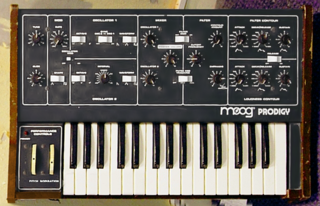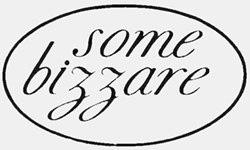No wave was an avant-garde music genre and visual art scene that emerged in the late 1970s in Downtown New York City. The term was a pun based on the rejection of commercial new wave music. Reacting against punk rock's recycling of rock and roll clichés, no wave musicians instead experimented with noise, dissonance, and atonality, as well as non-rock genres like free jazz, funk, and disco. The scene often reflected an abrasive, confrontational, and nihilistic world view.

Ninja Tune is an independent record label based in London, with a satellite office in Los Angeles. It was founded in 1990 by musicians Matt Black and Jonathan More, known collectively as Coldcut. The label was established as an outlet for Coldcut to explore a style distinct from that of the mainstream music industry.
Indie rock is a subgenre of rock music that originated in the United Kingdom, United States and New Zealand in the early to mid-1980s. Although the term was originally used to describe rock music released through independent record labels, by the 1990s it became more widely associated with the music such bands produced.
Popular music of the United Kingdom in the 1980s built on the post-punk and new wave movements, incorporating different sources of inspiration from subgenres and what is now classed as world music in the shape of Jamaican and Indian music. It also explored the consequences of new technology and social change in the electronic music of synthpop. In the early years of the decade, while subgenres like heavy metal music continued to develop separately, there was a considerable crossover between rock and more commercial popular music, with a large number of more "serious" bands, like The Police and UB40, enjoying considerable single chart success.

Noise rock is a noise-oriented style of experimental rock that spun off from punk rock in the 1980s. Drawing on movements such as minimalism, industrial music, and New York hardcore, artists indulge in extreme levels of distortion through the use of electric guitars and, less frequently, electronic instrumentation, either to provide percussive sounds or to contribute to the overall arrangement.

Add N to (X) were an English electronic music band formed in London in 1994. The original members were Andrew Aveling, Barry Smith (aka Barry 7) and Ann Shenton. Steven Claydon replaced Aveling in 1997.
Italo disco is a music genre which originated in Italy in the late 1970s and was mainly produced in the 1980s. Italo disco evolved from the then-current underground dance, pop, and electronic music, both domestic and foreign and developed into a diverse genre. The genre employs electronic drums, drum machines, synthesizers, and occasionally vocoders. It is usually sung in English, and to a lesser extent in Italian and Spanish.
WTII Records is an independent record label created in 2001 by former Wax Trax! Records employee Bart Pfanenstiel, and David Schock.

Independent music is a broad style of music characterized by creative freedoms, low-budgets, and a do-it-yourself approach to music creation, which originated from the liberties afforded by independent record labels. Indie music describes a number of related styles, but generally describes guitar-oriented music straying away from mainstream conventions. There are a number of subgenres of independent music which combine its characteristics with other genres, such as indie pop, indie rock, indie folk, and indie electronic.

RRRecords is a record label and used- and new-record shop based in Lowell, Massachusetts. RRRecords was the first American record label to publish underground "noise music" in the early 1980s as well as publishing the first American vinyl by Merzbow, Masonna, Hanatarash, Violent Onsen Geisha, and various other artists. In its first twenty years, the label issued hundreds of releases. RRR's owner, Ron Lessard, is a supporter of new artists who has created several sub-labels and series to specifically highlight unknown and underground musicians.
The All Seeing I were a British electronic music group from Sheffield, England, comprising Dean Honer, Jason Buckle and DJ Parrot.
White Noise are an English experimental electronic music band formed in London in 1968, after American-born David Vorhaus, a classical bass player with a background in physics and electronic engineering, attended a lecture by Delia Derbyshire, a sound scientist at the BBC Radiophonic Workshop. Derbyshire and Brian Hodgson, then both former members of electronic music project Unit Delta Plus, joined Vorhaus to form the band.
Hiem are an electronic dance duo from Sheffield, England, consisting of Nick "Nico" Eastwood and David "Bozz" Boswell.

The Moog Prodigy was a monophonic analogue synthesizer produced by Moog Music from 1979 to 1984. Of the 11,000 produced, versions released after 1981 included a control voltage/gate input on the back that allowed the VCF to be triggered and controlled by an external source. These later versions began at serial number 4610. The official model number of the instrument is 336. 336A would indicate a domestic (US) model, while a 336BX would indicate an export unit.

The music of Cardiff has been dominated mainly by rock music since the early 1990s with later trends developing towards more extreme styles of the genre such as heavy metal and metalcore music. It, along with the nearby music scene in Newport, has brought a number of musicians to perform or begin their careers in South Wales.

Kontour is an English electronic music artist, signed to Some Bizzare Records.

Some Bizzare [sic] Records was a British independent record label owned by Stevo Pearce. The label was founded in 1981, with the release of Some Bizzare Album, a compilation of unsigned bands including Depeche Mode, Soft Cell, The The, Neu Electrikk and Blancmange.
Chad Blinman is an American recording engineer and mixer, music producer, and electronic musician. He has worked with such artists as Face to Face, the Get Up Kids, Saves the Day, Jackson United, Faith and the Muse, Monica Richards, Senses Fail, Moneen, the Deep Eynde and Jarboe, and is a member of the remix/mash-up team the Legion of Doom and recording projects Viva Death and Real Space Noise. He is also on the faculty of the Music Production and Engineering department at Berklee College of Music.
Electronic rock is a music genre that involves a combination of rock music and electronic music, featuring instruments typically found within both genres. It originates from the late 1960s when rock bands began incorporating electronic instrumentation into their music. Electronic rock acts usually fuse elements from other music styles, including punk rock, industrial rock, hip hop, techno and synth-pop, which has helped spur subgenres such as indietronica, dance-punk and electroclash.









